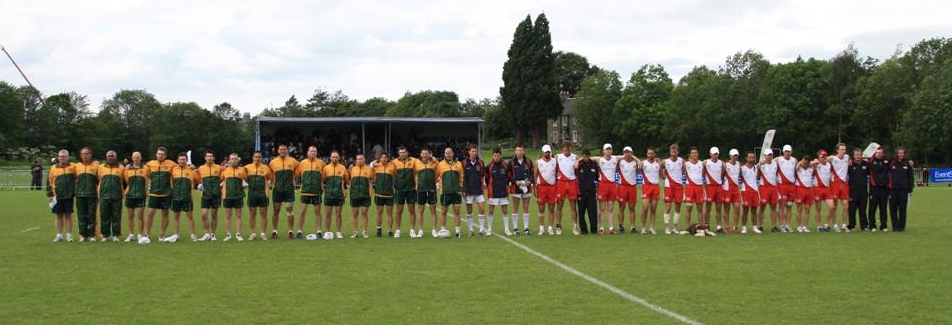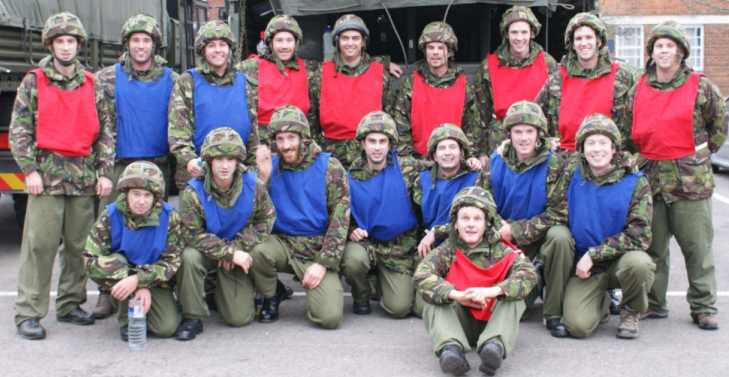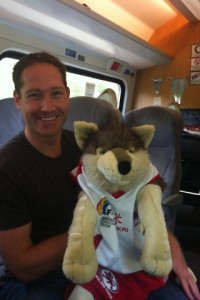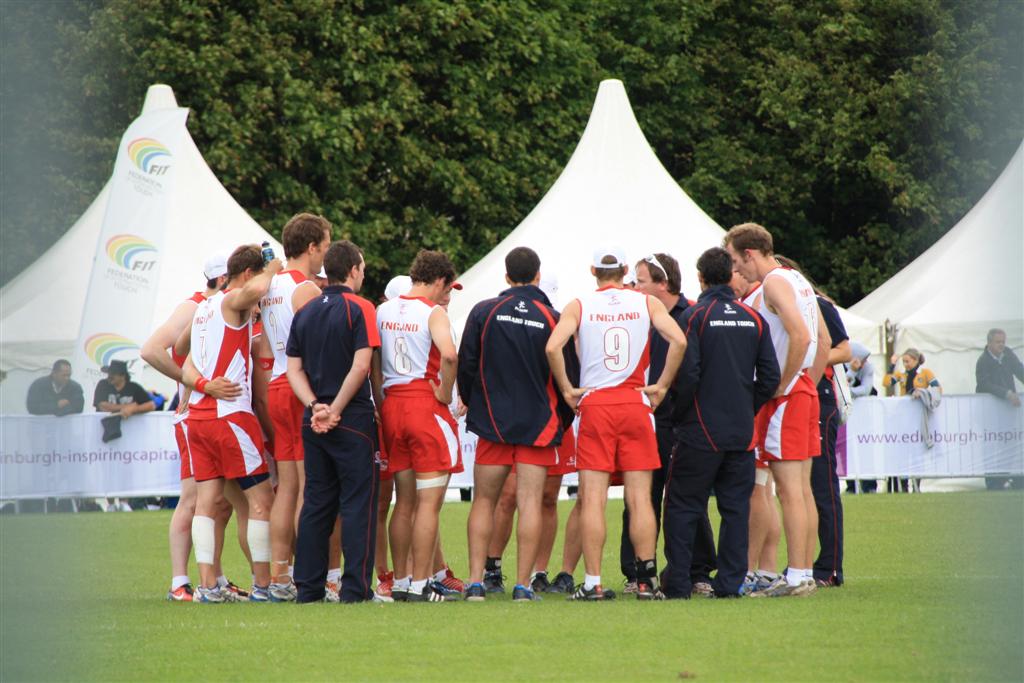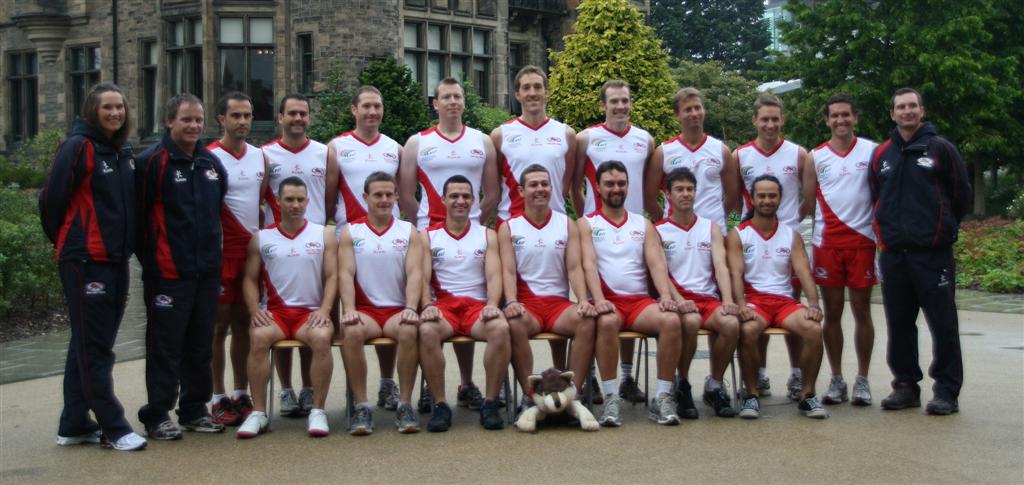Sign-up to receive all the latest news from England Touch
Europes First World Cup Final and Silver Medal

Men's 30's - Silver Medal
It is hard to pinpoint when exactly the planning started for a World Cup Final berth and silver medal, but it is easy to remember when it became a reality - Sunday 26th June 11am when we lined up next to Australia on pitch one, with national anthems blaring out followed by the whistle blow starting the Mens 30s final. We were here, we had made it, and we were in a World Cup final, the first European Team in a Touch World Cup Final!! Unbelievable.
There is not one thing or one person that made our team successful, but rather a combination of people, opportunities and factors that all clicked together at the right time. Looking back now it is easy to point out a few of the major milestones and contributors that made our success a reality.
I guess it is easiest to start with the coaching team - myself (Dante Germena) and Mike Stibbs. We had formed a successful coaching team three years prior to WC with Mike taking on the tough mantel as coach of the England Mens Open side with myself acting as captain and assistant coach. Following success at the European Championships (France), Tri-Nations in Toulouse and Home Nations (Glasgow) it was time for a break from coaching. Those that have coached know the huge time commitment associated with this role; and how hard it is to both play and coach. So we decided to hand in our notice and moved up into the Mens 30s to just play touch and build towards WC. Coaching retirement was short lived. Due to work commitments, the existing Mens 30s coach had to step down shortly after the 2010 European Championship, just 7 months before World Cup. Mike and I were by default the logical replacements and picked up the reigns, just with roles reversed this time, with myself taking over the role of coach and Mike remaining on as captain and assisting with the coaching. Working as a coaching team instead of as an individual is much easier: - it has allowed us to bounce ideas off each other, challenge each other and ensuring the small things weren't missed. It has been a key part of our success in coaching Mens Open and Mens 30s.
When we moved into the 30s side, we were lucky that the team at that time had a great manager in place and were extremely grateful that she stayed on in that role. Sue Cross was a huge help behind the scenes, on the side of the pitch in the build-up and at the WC. Sue ensured that everything ran as smoothly as possible right down to supporting the coaching team with technical analysis and putting some of the team in their place.
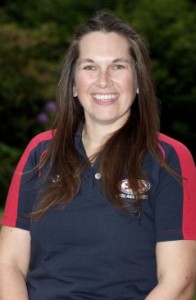
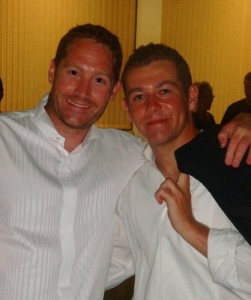
Players are obviously a key part to any team and are ultimately responsible for ensuring the coachs plan is carried out on the field and for doing the work. The atmosphere within the team was a key success factor, largely driven on by Q (vice-captain & fine master) and Steve Cleary (team comedian and top scorer). The players showed a willingness and ability to adapt to change. Whoever said you can't teach an old dog new tricks was not talking about the Mens 30s. The guys accepted position changes, took on a new defensive pattern, new attacking plays and also jumped in with both feet at a brutal day at the British Army barracks in Guildford (organized by Andy Lee). The Boot Camp was a great day of training and another key point in our development where our mental strength and leadership were put to the test.
When Mike and myself left the open side for 30s we were joined by 4 other Mens open players and two mixed open players bringing together many of the England Touch stalwarts from the last 10 years. Part of the reason for the teams success, was the depth of playing experience across the squad (in excess of 400 Eng Caps). In addition the Mens 30s team already had base of players that won the 2008 European Championships and 2009 Home Nations. With that strong base we went on to win the 2010 European Championships in Bristol and created the foundations for the World Cup Mens 30s side.
World Cup is the longest, hardest and toughest event on the touch circuit; and following the World Cup trials in November 2010, I was pretty confident that we had strengthened the existing squad and were now capable of challenging for medal. The end of February was one of the toughest times during the campaign, when the final squad of 16 had to be selected. After hours of debate deep in the French Alps, Mike and I arrived at the final squad of 16 players that would participate in the World Cup.
Post February, the campaign started gathering some momentum with some unexpected developments in the Mens 30 grade, notably the withdrawal of New Zealand and Austria resulting in our draw being simplified into one pool. We wanted to play the best in the game and were disappointed that NZ was not coming. However with their withdrawal, it opened an opportunity for us to take a final was now the definite target as opposed to bronze medal. Also of note was the appointment of a team mascot (The Wolf) following a team viewing of a Hollywood sports classic at one of our training camps, along with the team slogan which became a frequent motivator (Feed the Wolf).
I also managed to finalise another addition to the team a non-playing assistant coach -John Morris. It would be critical to have a non-playing coach in the box to ensure that everything ran smoothly during the tournament with Mike and myself playing. John only joined a couple of days before the tournament, flying in from Australia at his own cost. Prior to the tournament John watched a lot of footage of the team and was in regular contact with myself, enabling him to hit the ground running when he arrived. Having an independent coach reiterating the strategy and making minor adjustments made a huge difference. John was a great asset to our ever expanding management team and a massive benefit to the team.
Seven months is not a lot of time to prepare, but in reality Mike & I had already talked about new/varied offensive and defensive patterns post retirement and prior to taking over the coaching of the Mens 30s. Coaching again allowed us to put these into practice with the Mens 30s side. Support from coaches and players in Australia & NZ was crucial as was the insight gained from the teams oldest member, Mike Abromowitz who participated in the New South Wales State Cup in the period leading up to the tournament.
With the ups, we also had our share of downs. Player injuries started taking their toll a few weeks out from World Cup. Unfortunately this resulted in the withdrawal of one of our most experienced players shortly before the tournament. Similarly Day 3 of the tournament was when the wheels started to come off, losing two players against South Africa in the morning, and then another three during the Fiji game following an almighty collision. The good news was that by the time we had beaten Fiji on day three we had done enough work to qualify for the semi-finals. It was then about resting injured players in the remaining pool games until the semi. The team pulled together with the able bodied players stepping up in the game against Japan where we fielded only 10 players, and the wingers stepping up to work the middle berths against Luxembourg the following day. This allowed our injured players valuable recovery time for the semi where we were pushed by France once again in a tight game. When the whistle blew in that game after 40mins of fierce competition, the atmosphere was electric, as if we had all plugged into the mains, safe in the knowledge that we had secured a silver medal at a minimum and realised our objective of making the final against the best Masters team in the world. After lots of man-hugging we eventually composed ourselves and started to refocus for the final.
Mention does also need to be made of all our supporters, particularly the partners, wives, children, family and friends that also made sacrifices in this campaign. We were pleased to welcome two new youngsters - Olivia Grace and Jackson Tane join to our support group shortly before the World Cup. Our supporters are as much a part of this silver medal as the players are so thank you all for putting up with the players throughout the campaign.
The medical team, particularly Scott and Cameron were great in managing injuries and players through the tournament which ensured we had enough bodies on the field for the key matches. Without the support of the medical team with strapping and pre-match preparation, we could have been in some serious trouble. Thank you also to Macca for pre-tournament tour management and ensuring we had some fine kit to play in; and Bridget and Tumbles for on tour management.
It was great to see France collect the bronze medal from our grade. They have helped to push us all the way since the 2008 Mens Open European Championships (Paris) right up until our semi-final on the penultimate day of the tournament. It is encouraging to know that should we have failed, another European side would have been there to take our spot. We should also mention the other sides that pushed us during the tournament, notably a much improved Scotland, Fijis never say die attitude and flare; and South Africas relentless driving.
During those 40 minutes of the final, we emptied the tank however unfortunately couldn't emulate our performance from the pool round against Australia. When the final whistle blew, nobody seemed to care about the loss as we were still the first European side, the first English side that has made a World Cup final and we had a silver medal for our efforts. And for now just for now, that is good enough. Next time however...
(Written by Dante Germena)